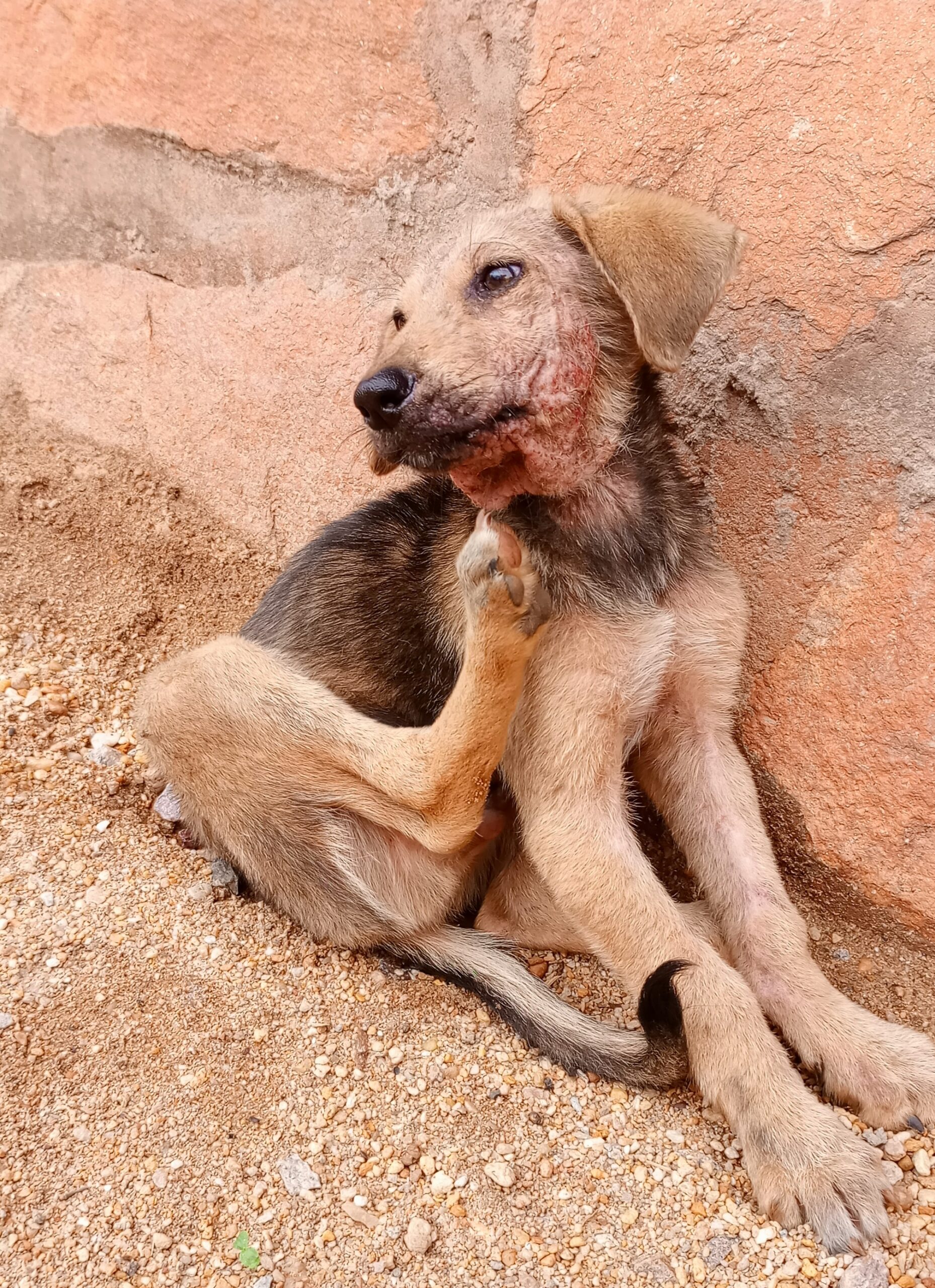
🐾 Why Your Dog’s Coat Looks Dull — And How to Bring Back the Shine
Have you recently looked at your dog and thought, “Hmm, my dog’s fur doesn’t shine like it used to?” Maybe the coat looks dry, rough, or patchy, or the skin seems flaky and dull no matter what shampoo or food you try.
You’re not alone — this is one of the most common concerns dog owners bring to Superior Animal Clinic in Makindye, Kampala every week. Whether you’re in Ntinda, Muyenga, Munyonyo, Nsambya, Old Kampala, Kasubi, or Lugogo, many pet owners type the same questions into Google:
“Why is my dog’s coat dull?”
“How do I make my dog’s fur shiny again?”
“Best vet near me for dog coat treatment in Kampala.”
Here’s the truth: a dull coat is more than just a beauty issue — it’s your dog’s way of showing that something inside isn’t right. Sometimes it’s a simple diet issue. Other times, it’s caused by parasites, allergies, or hidden diseases affecting your pet’s skin and overall health.
At Superior Animal Clinic, we don’t just treat the coat — we find the real cause behind the dullness. Our experienced vets combine professional diagnostics, nutrition advice, and gentle care to help your dog’s fur return to its natural, healthy shine.
The best part? Most cases of dull coat in dogs are completely reversible with the right veterinary care, good feeding habits, and a few small home adjustments.
So if your dog’s coat has lost its sparkle, don’t worry — you’ve just found Kampala’s trusted clinic for restoring your pet’s coat and confidence. 🐕✨
Let’s explore what causes dull coat in dogs, how to fix it, and why Superior Animal Clinic is the top choice for dog coat and skin treatment in Makindye and across Kampala.
🐶 What Is a Dull Coat in Dogs?
A dull coat means your dog’s fur looks lifeless, dry, rough, or flaky instead of smooth, shiny, and soft. It’s often a visible sign that something deeper — like poor nutrition, parasites, allergies, or disease — is affecting your pet’s health.
At Superior Animal Clinic, we treat dull coat not as a cosmetic issue but as a health condition that needs proper diagnosis and care.
Common Causes of Dull Coat in Dogs in Uganda
When a dog’s shiny coat starts to fade, it’s often a sign that something deeper is going on. In Uganda, dull coat problems are very common, especially in areas like Makindye, Muyenga, Munyonyo, Ntinda, Rubaga, and Nakawa, where heat, humidity, and parasites thrive.
Below are the most common causes our vets at Superior Animal Clinic see in dogs with dull, rough, or dry fur 👇
1. Poor Nutrition and Low-Quality Diets
The most frequent cause of dull coat in Ugandan dogs is nutritional deficiency. Many dogs are fed leftover food or maize-based meals that lack essential nutrients such as protein, omega-3 and omega-6 fatty acids, zinc, and vitamins A and E.
These nutrients are what give your dog’s fur that natural shine and softness. Without them, the coat becomes dry, brittle, and lifeless.
👉 Tip from our vets: Always feed your dog a balanced, high-protein diet or a vet-recommended food like Royal Canin, Pedigree, or OptiMeal, and supplement with omega oils when necessary.
🪳 2. External Parasites (Fleas, Ticks, and Mange Mites)
Uganda’s warm and humid climate makes it perfect for parasites to thrive. Fleas, ticks, and mange mites are major enemies of a healthy coat. They cause constant itching, scratching, and hair breakage, leaving the coat patchy and dull.
At Superior Animal Clinic, we use safe anti-parasitic treatments such as Bravecto, Simparica, or Fiptox to eliminate these pests and restore coat health.
👉 Warning: Even indoor dogs in areas like Kololo, Bukoto, and Bugolobi can catch fleas or mites from other pets or contaminated bedding.
3. Food Allergies and Sensitivities
Some dogs are allergic to certain ingredients like beef, chicken, wheat, or soy, leading to itching, dry skin, and coat dullness.
When this happens, no amount of bathing or oiling will fix it — the only solution is to identify and remove the trigger food.
Our vets perform diet trials and allergy evaluations to find the root cause and recommend suitable hypoallergenic diets.
4. Over-Bathing or Using the Wrong Shampoo
Many pet owners mean well by bathing their dogs frequently, but too much bathing — especially with human soaps or harsh shampoos — strips away natural oils that keep the coat soft and glossy.
At Superior Animal Clinic, we recommend vet-approved moisturizing shampoos and conditioning rinses that cleanse gently while protecting the skin barrier.
👉 Bathing once every 2–3 weeks is ideal for most breeds unless advised otherwise by your vet.
5. Skin Infections (Bacterial or Fungal)
Dogs in humid areas like Munyonyo, Buziga, and Ndejje are prone to fungal infections that cause dull, patchy, or greasy coats. Bacterial skin infections can also make the fur look rough and uneven.
Our clinic performs skin scrapings and lab tests to confirm infection type and provides targeted antifungal or antibiotic treatments to heal both the skin and coat.
6. Internal Diseases (Liver, Kidney, or Thyroid Problems)
A dull coat can sometimes signal deeper internal issues such as liver disease, hypothyroidism, or kidney problems. These conditions interfere with nutrient absorption and hormone balance, leading to dry, lifeless fur.
That’s why our vets at Superior Animal Clinic always perform a complete health check — not just a surface-level examination — when treating dull coat cases.
7. Stress, Neglect, and Poor Grooming Habits
Dogs that are stressed, anxious, or neglected often lose their coat’s luster. Lack of regular brushing, cleaning, or bonding time can lead to matting and dull fur.
Regular grooming stimulates the skin’s oil glands, improving coat texture and circulation. Even 5–10 minutes of brushing daily can make a huge difference!
8. Environmental Factors
Kampala’s climate — especially in dusty or humid areas like Katwe, Kasubi, and Nsambya — can contribute to coat dullness. Constant exposure to dust, dirt, heat, and pollution can dry out your dog’s coat and cause skin irritation.
Keeping your dog in a clean, shaded, and cool environment helps maintain healthy skin and fur.
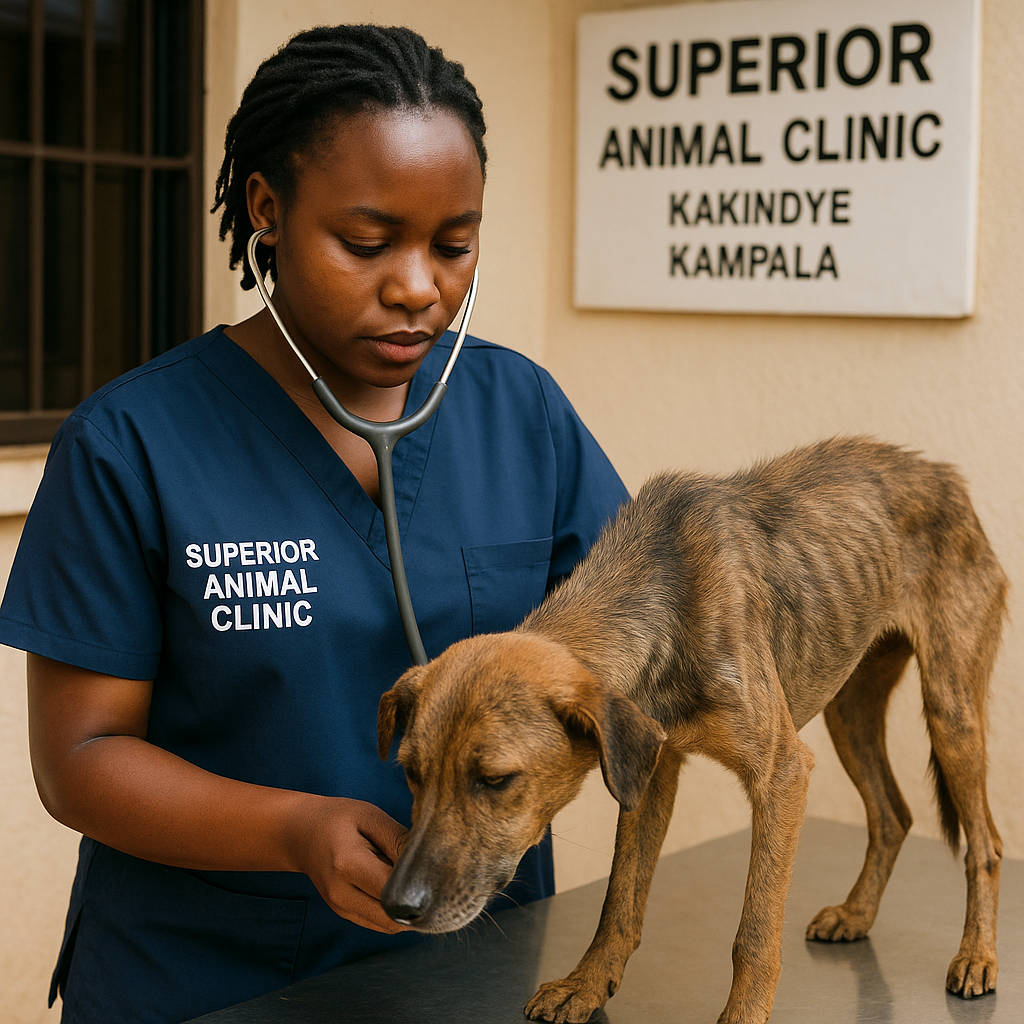
9. Worm Infestation and Poor Deworming Routine
Many pet owners are surprised to learn that internal parasites like worms can cause coat dullness too. Worms steal nutrients from your dog’s food, leaving them malnourished and dull-coated.
We recommend deworming every 3 months using quality veterinary products — and ensuring all pets in the household are treated at the same time.
10. Age and Hormonal Changes
Older dogs or those with hormonal imbalances naturally produce less oil, making the fur appear duller. Females after giving birth or during heat cycles may also experience temporary coat dullness.
Our vets provide nutritional supplements and supportive care to maintain coat health during these life stages.
🐕 Summary: The Main Triggers of Dull Coat in Ugandan Dogs
| Cause | Description | Common in Areas |
| Poor diet | Low in protein, vitamins, and omega oils | Katwe, Kasubi, Nsambya |
| Parasites | Fleas, ticks, mange | Makindye, Muyenga, Rubaga |
| Allergies | Food or environmental | Ntinda, Kololo, Nakawa |
| Over-bathing | Using harsh soaps or human shampoo | Urban areas |
| Infections | Fungal or bacterial | Humid zones like Munyonyo |
| Internal illness | Thyroid, liver, or kidney disease | All over Kampala |
| Stress/neglect | Poor grooming or emotional stress | Urban & suburban dogs |
| Worms | Poor deworming routine | Rural and urban settings |
| Environment | Dust, heat, humidity | Katwe, Ndejje, Buziga |
💡 Expert Advice from Superior Animal Clinic
“A shiny coat is a mirror of good health. When your dog’s coat starts to dull, it’s your first warning sign to visit the vet — not just the grooming salon.”
🩺 Best Treatment for Dull Coat in Dogs in Uganda at Superior Animal Clinic
At Superior Animal Clinic, we understand that a dull coat is not just a cosmetic issue — it’s a health signal. When your dog’s fur loses its shine, we look beyond the surface to identify the real cause. Every treatment we provide is personalized, evidence-based, and guided by veterinary expertise to ensure lasting coat and skin health.
Here’s how we treat dull coat in dogs across Kampala
Step 1: Professional Diagnosis and Veterinary Examination
We start with a comprehensive check-up to understand your dog’s health and environment. Our vets look at:
- Dietary history – What and how your dog eats daily.
- Grooming routine – Shampoos, bathing frequency, and coat care.
- Parasite exposure – Ticks, fleas, or mange mites.
- Underlying medical conditions – Liver disease, thyroid issues, or hormonal imbalances.
If needed, we conduct skin scrapings, blood tests, or microscopic checks to detect infections, allergies, or nutrient deficiencies.
This helps us pinpoint why your dog’s coat is dull instead of guessing.
Step 2: Treating the Root Cause
Once the cause is identified, we tailor treatment to your dog’s specific needs.
Here are the common treatment approaches we use at Superior Animal Clinic:
✅ 1. Nutritional Therapy
We prescribe balanced, vet-recommended diets rich in high-quality protein and essential fatty acids (Omega 3, 6, and 9).
Our vets may recommend:
- Royal Canin Skin & Coat Care
- Purina Pro Plan Sensitive Skin
- Home-prepared diets with boiled chicken, eggs, fish (like tilapia or sardines), and vegetables
We may also add vitamin supplements containing biotin, zinc, and Vitamin E to restore coat shine and strength.
✅ 2. Parasite Control
In Kampala’s warm, humid climate, parasites are a major cause of dull coat.
We provide safe, effective parasite control using:
- Bravecto, Simparica, or Fiptox (for fleas, ticks, and mites)
- Regular deworming with approved veterinary dewormers
- Medicated baths with antifungal and antibacterial shampoos to soothe skin and eliminate irritants
✅ 3. Skin and Coat Restoration Treatments
For dogs with severe dullness or hair loss, we use:
- Moisturizing sprays or leave-on conditioners to restore natural oils
- Omega oil capsules or biotin supplements
- Topical creams for allergic or fungal skin conditions
- Antibiotics or antifungal medications if infections are confirmed
✅ 4. Managing Allergies and Hormonal Disorders
If your dog’s dull coat is linked to allergies or hormonal issues (like hypothyroidism), our vets provide targeted management:
- Allergy testing and food elimination diets
- Medications to balance hormones
- Anti-itch therapies to reduce scratching and skin trauma
Step 3: Gentle, Vet-Approved Grooming
We educate every pet parent on safe grooming practices:
- Use vet-approved dog shampoos only (never human soaps or detergents).
- Brush your dog’s coat daily to remove dead hair and distribute natural oils.
- Bathe only once every 2–4 weeks unless otherwise advised by the vet.
- Keep your dog’s bedding and environment clean and flea-free.
Proper grooming enhances circulation and helps the coat stay glossy naturally.
Step 4: Follow-Up and Coat Health Maintenance
At Superior Animal Clinic, we don’t stop after treatment — we walk with you until your dog’s coat fully recovers.
We schedule follow-up visits to:
- Re-examine coat texture and growth
- Monitor for any recurring parasites or infections
- Adjust diet and supplements as needed
Within 3–6 weeks, most dogs regain a shiny, smooth, and soft coat — a clear sign of restored health.
💡 Bonus Tip: Preventing Dull Coat After Treatment
To prevent future coat dullness, our vets recommend:
- Feeding high-quality dog food consistently
- Regular deworming and flea prevention
- Gentle brushing and monthly grooming
- Providing clean drinking water daily
- Reducing stress through play, walks, and bonding
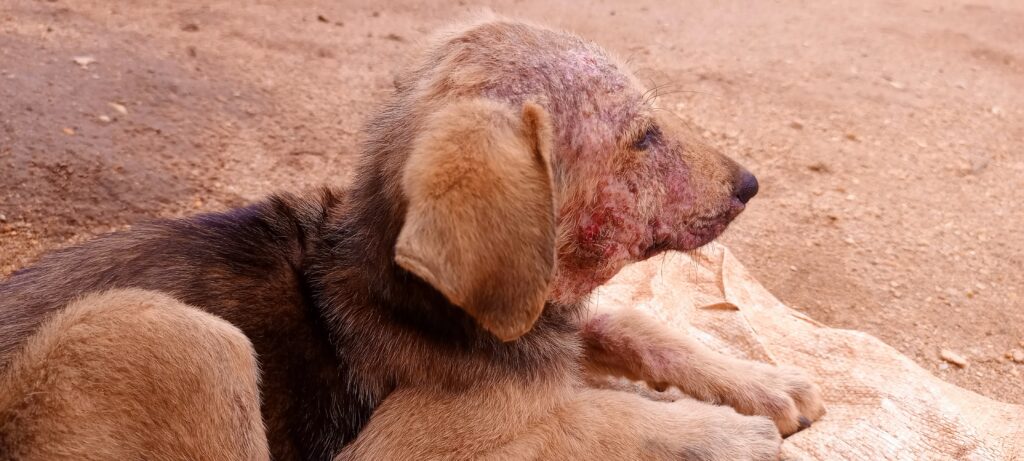
🐕 Common Types of Dull Coat Cases Treated at Superior Animal Clinic
In Uganda, we often see:
- Nutritional dull coat – from low-quality diets or leftover food.
- Parasitic dull coat – caused by fleas, ticks, and mange.
- Allergic dull coat – from food intolerance or environmental triggers.
- Medical dull coat – due to thyroid or liver issues.
🍗 Best Foods for Dogs with Dull Coat
A shiny coat starts from the inside. In Uganda, many cases of dull or rough fur in dogs come down to poor diet or low-quality feeding habits — like feeding leftovers, posho alone, or too much oily food.
At Superior Animal Clinic in Makindye, Kampala, we’ve seen that when dog owners switch to a balanced, nutrient-rich diet using readily available local foods, their dog’s coat improves dramatically within weeks.
Below is a list of the best locally available foods and how to feed them safely.
Practical Feeding Guide for Dogs with Dull Coat in Uganda
(By Superior Animal Clinic, Makindye – Kampala’s trusted pet care experts)
Restoring your dog’s coat shine isn’t just about using the right shampoo — it starts with what you feed every day. A proper feeding routine rich in proteins, healthy fats, vitamins, and minerals can transform a dull coat into a smooth, glossy one within weeks.
Here’s a step-by-step practical feeding guide you can start using right away 👇
🍽 Step 1: Feed a Balanced Combination at Every Meal
Each meal should include these 3 key components:
| Food Type | Local Examples | Why It’s Important |
| Protein | Boiled beef, chicken, goat meat, fish (tilapia, Nile perch), eggs | Builds strong hair and repairs damaged skin |
| Healthy Carbohydrates | Boiled rice, sweet potatoes, Irish potatoes, pumpkin | Provides energy and supports digestion |
| Vitamins & Fats | Carrots, sukuma wiki, groundnut paste, small spoon of fish oil | Adds coat shine, prevents dryness & flaking |
💡 Pro Tip: Always boil food — never fry or season it. Keep meals clean and lightly cooked for easy digestion.
🕕 Step 2: Create a Feeding Schedule (By Age & Size)
| Dog Age / Type | Meals Per Day | Example Feeding Plan |
|---|---|---|
| Puppies (2–6 months) | 3–4 small meals | Morning: Eggs + rice Afternoon: Fish + pumpkin Evening: Chicken + potatoes |
| Adult Dogs (7 months–6 years) | 2 balanced meals | Morning: Beef + carrots + rice Evening: Fish + sweet potatoes + sukuma wiki |
| Senior Dogs (7+ years) | 2 light meals | Morning: Boiled fish + pumpkin Evening: Chicken + rice |
🐾 Tip: Always feed at regular times — consistency helps digestion and nutrient absorption.
🥄 Step 3: Add Coat-Boosting Supplements
To speed up recovery from dull coat, our vets at Superior Animal Clinic recommend:
| Supplement | Benefit | Local Availability |
| Omega 3 & 6 oils (Fish oil capsules) | Adds natural shine and softness | Found in pharmacies & vet shops in Kampala |
| Zinc & Biotin syrup | Strengthens fur and reduces breakage | Vet-prescribed at Superior Animal Clinic |
| Multivitamin paste | Boosts skin immunity | Available at most vet clinics |
🩺 Always consult our veterinarians before starting supplements — the correct dosage depends on your dog’s breed and weight.
Step 4: Avoid Feeding Mistakes That Cause Dull Coat
🚫 Don’t feed leftover oily or spicy food
🚫 Avoid feeding only posho or rice (low in nutrients)
🚫 Don’t skip meals — irregular feeding affects skin health
🚫 Avoid raw eggs and raw fish (can cause stomach upset)
✅ Always keep your dog’s feeding area clean and provide fresh drinking water all day.
🍱 Sample 1-Day Meal Plan for a Medium-Sized Dog (15–20kg)
| Time | Meal | Notes |
|---|---|---|
| 7:30 AM | 1 boiled egg + 1 cup rice + ½ cup carrots 🥚🍚🥕 | Add a teaspoon of fish oil |
| 1:00 PM | (Optional snack) Small piece of cooked fish 🐟 | Great for omega boost |
| 6:30 PM | Boiled beef (1 cup) + mashed pumpkin (1 cup) + few sukuma leaves 🥩🎃🥬 | Balanced nutrients for coat recovery |
💧 Tip: Provide clean water all day — coat shine starts with hydration!
🐶 Step 5: Track Your Dog’s Coat Progress
In 2–4 weeks, you should notice:
✅ Softer, shinier fur
✅ Less dandruff or flaking
✅ Reduced hair loss
✅ More active and happy dog
If no improvement is seen, visit Superior Animal Clinic, Makindye, for a full veterinary examination — dull coat may signal an internal condition like parasites or hormonal imbalance.
❤️ Expert Tip from Superior Animal Clinic
“Good feeding, regular deworming, and flea control are the holy trio for a shiny, healthy coat. Feed clean, balanced meals — and your dog will glow from nose to tail.”
— Dr. Ronnie, Lead Veterinarian, Superior Animal Clinic, Kampala
🌿 Home Remedies for Dull Coat (with Vet Guidance)
While vet care is essential, these home remedies can support recovery:
- Add a teaspoon of fish oil or coconut oil to meals (with vet approval).
- Regular brushing to remove dead fur and stimulate oil glands.
- Mild oatmeal baths to soothe irritated skin.
- Keep your dog hydrated — water helps maintain coat moisture.
- Ensure regular deworming and flea prevention.
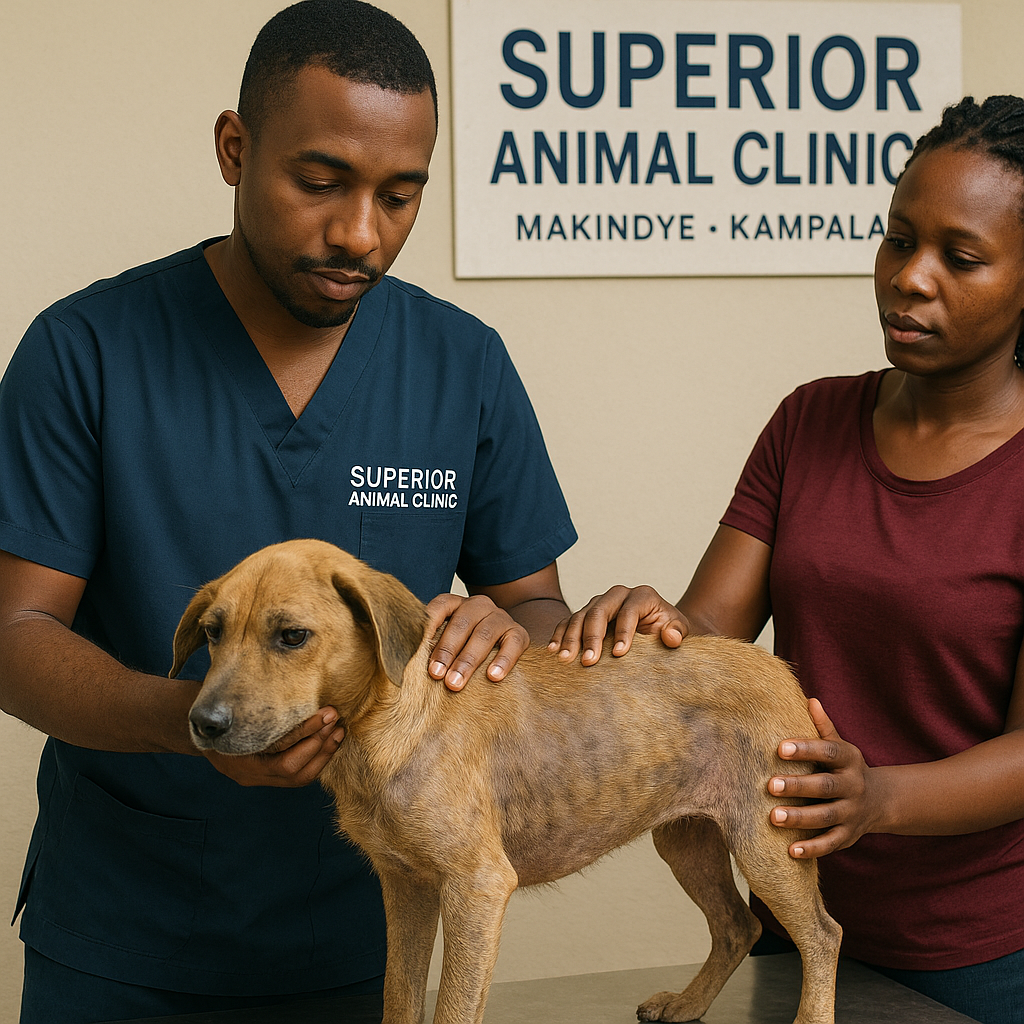
🧬 Predisposing Factors – Dogs More Prone to Dull Coat
Breeds like German Shepherds, Rottweilers, Labradors, and local mixed breeds in Kampala often develop dull coats because of:
- Thick fur prone to heat and parasites
- Outdoor lifestyles
- Infrequent grooming
- Poor diet or low-quality feeds
❓ FAQs About Dull Coat in Dogs in Uganda
(Answered by Superior Animal Clinic, Makindye – Kampala)
1. 🐶 What causes a dull coat in dogs in Uganda?
A dull coat in dogs is usually caused by poor nutrition, parasites, skin infections, or lack of essential fatty acids. In Uganda, common causes include feeding dogs only posho or leftover food, not deworming regularly, or using harsh shampoos. At Superior Animal Clinic, we diagnose the exact cause and recommend personalized treatment for faster coat recovery.
2. What foods can I feed my dog for a shiny coat in Uganda?
For a shiny coat, feed protein-rich and vitamin-packed foods such as boiled beef, chicken, fish (tilapia or Nile perch), eggs, sweet potatoes, carrots, pumpkin, and sukuma wiki. Adding a small spoon of fish oil or groundnut paste helps improve coat shine naturally.
3. Where can I treat a dog with a dull coat in Kampala?
The best place to treat a dull coat in Kampala is Superior Animal Clinic located along Salaama Road in Makindye. Our experienced veterinarians perform a full coat and skin assessment, check for parasites or nutritional deficiencies, and create a customized feeding and supplement plan for your dog.
4. What are the best supplements for a dull coat in dogs?
The top vet-recommended supplements for coat improvement are Omega 3 & 6 oils, Zinc and Biotin syrup, and multivitamin paste. These can be prescribed at Superior Animal Clinic after a proper examination. Avoid giving human supplements to dogs without vet advice.
5. How often should I bathe my dog with a dull coat?
Dogs with dull or flaky coats should be bathed once every 2–3 weeks using a mild, vet-approved dog shampoo. Overbathing or using human soap can dry out the skin and worsen the dullness. Our vets can recommend the best medicated or moisturizing shampoo for your dog’s coat type.
6. How long does it take for a dog’s coat to become shiny again after treatment?
With proper feeding, supplements, and vet-guided care, you can expect noticeable improvement in 2–4 weeks. Full coat restoration may take up to 8 weeks, depending on the dog’s health, age, and breed. Consistency in feeding and grooming is key.
7. 🐾 How can I prevent my dog’s coat from becoming dull again?
Prevent dull coat by feeding balanced homemade or commercial meals with protein and omega oils, deworming every 3 months, controlling fleas and ticks, and regular brushing. Superior Animal Clinic provides year-round preventive care plans to help keep your dog’s coat shiny and healthy.
8. Is there a veterinary clinic near me that helps with dog coat problems?
Yes! Superior Animal Clinic in Makindye, Kampala is one of the leading veterinary clinics in Uganda for treating dull coats, skin infections, and nutrition-related coat issues. We serve clients from Muyenga, Nsambya, Munyonyo, Rubaga, Kabowa, and beyond.
9. Can I use home remedies for my dog’s dull coat?
Yes, but with caution. Safe remedies include adding a teaspoon of fish oil, coconut oil, or groundnut paste to meals 2–3 times a week. Regular grooming and proper hydration also help. Avoid using raw eggs or human hair oils. For best results, consult our vets before starting any home treatment.
10. How much does dull coat treatment cost in Kampala, Uganda?
Treatment cost depends on the cause — nutritional, parasitic, or dermatological. On average, consultation and treatment for dull coat at Superior Animal Clinic ranges from UGX 30,000 – UGX 120,000, including vet checkup and medication. Supplements may vary based on your dog’s weight and condition.
11. Can parasites cause dull coat in dogs?
Yes! Fleas, ticks, and intestinal worms can cause dull, patchy, or itchy coats. Regular deworming and parasite control are essential. Superior Animal Clinic provides comprehensive parasite treatment and prevention to restore your dog’s healthy coat quickly.
12. 🐕 Does breed affect a dog’s coat quality?
Absolutely. Breeds like Labradors, German Shepherds, and Golden Retrievers are more prone to dull coats if their diets lack omega oils. Short-haired breeds like Basenjis may appear dull due to dust or poor grooming. Our vets can recommend breed-specific diets to maintain coat shine year-round.
13. 🌿 What’s the best natural oil for dogs with dull coats in Uganda?
Locally available oils such as fish oil, coconut oil, and sunflower oil are great for restoring coat shine. Just add ½ teaspoon for small dogs or 1 teaspoon for larger dogs to meals 3–4 times a week. Always introduce oils gradually to avoid stomach upset.
14. My dog’s coat looks dull even after feeding well. What should I do?
If nutrition seems fine but the coat is still dull, it could be due to internal parasites, allergies, or hormonal issues. Visit Superior Animal Clinic for a professional diagnosis. We perform blood tests, skin checks, and parasite screening to identify the root cause and provide lasting solutions.
15. Do you offer home visits for dogs with dull coat problems in Kampala?
Yes! Superior Animal Clinic offers home veterinary visits within Makindye, Munyonyo, Muyenga, Nsambya, and nearby areas. Our vets can assess your dog, provide supplements, and guide you on coat care from the comfort of your home.
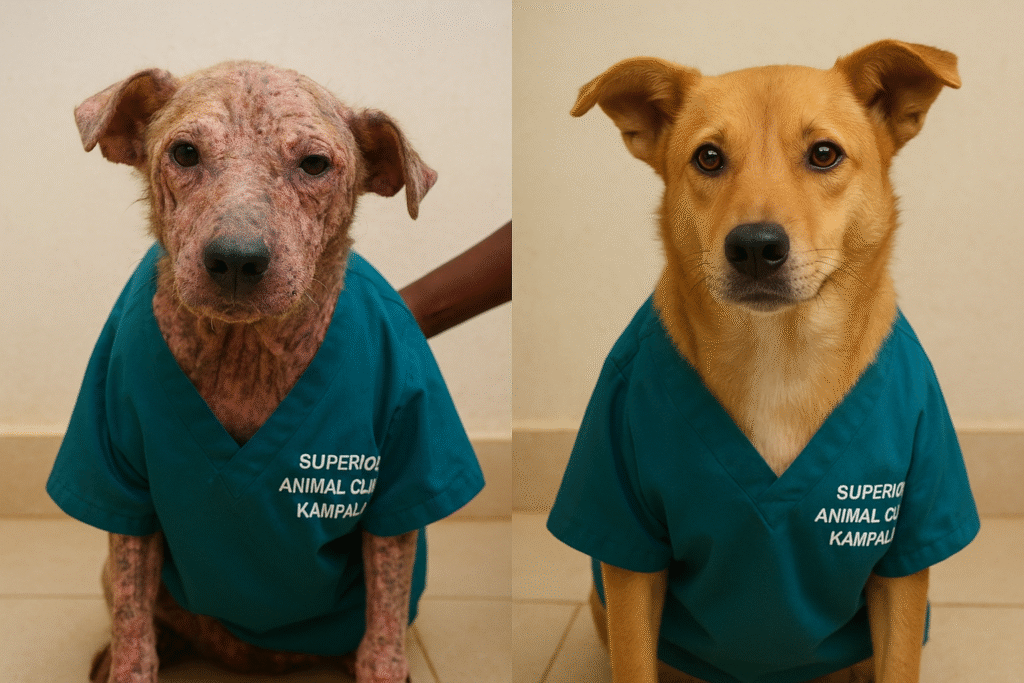
✨ How to Make Your Dog’s Coat Shine Again in Kampala, Uganda
Seeing your dog’s coat dull and lifeless can be worrying — but the good news is, you can restore that healthy shine with the right care, nutrition, and veterinary guidance. At Superior Animal Clinic in Makindye, we help dog owners bring back their dog’s glossy coat safely and effectively.
Here’s how you can do it, step by step:
1️⃣ Start With a Vet Check-Up
Before trying anything at home, ask yourself:
- Is my dog scratching or losing hair?
- Is there dandruff, bald spots, or redness?
- Has the coat been dull for more than a few weeks despite feeding well?
Why it matters: Dull coat can signal parasites, allergies, or internal health issues.
✅ Action: Book a professional coat check at Superior Animal Clinic, Makindye. We’ll identify the exact cause and create a treatment plan tailored to your dog.
2️⃣ Feed a Nutrient-Rich, Coat-Boosting Diet
A shiny coat starts from the inside. Include high-protein foods and healthy fats:
- Protein: Boiled beef, chicken, goat meat, eggs, fish (tilapia/Nile perch)
- Vegetables: Pumpkin, carrots, sukuma wiki
- Carbs: Brown rice, sweet potatoes (in moderation)
- Healthy fats: Fish oil, coconut oil, or a small spoon of groundnut paste
💡 Interactive Tip: Track your dog’s diet in a simple notebook or phone app — note foods and portion sizes. Within 2–4 weeks, you should start seeing softer, glossier fur.
3️⃣ Grooming Is Key — But Do It Right
- Brush daily: Removes dead hair, stimulates oil glands, and spreads natural oils.
- Bathe wisely: Only once every 2–3 weeks with vet-approved shampoos. Overbathing or harsh soaps dries out the coat.
- Trim nails & check ears: Healthy nails and clean ears reduce stress and infections that affect coat quality.
🐶 Interactive Challenge: Try a 5-minute brushing session each day — your dog will love it, and you’ll notice the fur getting smoother.
4️⃣ Parasite Control & Deworming
In Kampala’s climate, fleas, ticks, and worms are common culprits for dull coats.
- Treat with vet-recommended products like Simparica, Bravecto, or Fiptox.
- Deworm regularly — at least every 3 months.
- Inspect the coat weekly for signs of irritation or mites.
✅ Action: Bring your dog to Superior Animal Clinic for a parasite screening and prevention plan tailored to your area (Muyenga, Munyonyo, Nsambya, Buziga).
5️⃣ Use Vet-Approved Supplements
Some dogs need an extra boost to restore coat shine:
- Omega 3 & 6 oils – for hydration and smoothness
- Biotin & Zinc supplements – strengthen hair follicles
- Multivitamin syrups or pastes – support overall skin and coat health
💡 Interactive Tip: Note your dog’s weight and coat condition before starting supplements. Track improvements weekly — it’s satisfying to watch the shine return!
6️⃣ Maintain Hydration & Reduce Stress
- Always provide fresh, clean water — dehydration can make coats dry and brittle.
- Reduce stress by giving regular walks, playtime, and bonding sessions. Stress affects fur quality just like it affects humans.
7️⃣ Follow-Up & Consistency
- Most dogs show visible improvement in 2–4 weeks, with full recovery in 6–8 weeks.
- Regular vet check-ups help catch any underlying conditions early.
- Keep a consistent feeding, grooming, and parasite prevention routine — it’s the key to long-term coat health.
💡 Prognosis: What Happens If Dull Coat Is Not Treated?
Ignoring a dull coat can lead to:
- Chronic itching and skin infections
- Hair loss and sores
- Poor immunity
- Hidden internal disease going untreated
Early diagnosis gives your dog the best chance of full coat recovery and better overall health.
❤️ Why Dog Owners Choose Superior Animal Clinic for dull coat treatment in dogs in Uganda
✅ Experienced veterinarians for dull coat and skin issues
✅ Affordable diagnostic and treatment plans
✅ Personalized care for every dog
✅ Accessible to all areas — Ntinda to Munyonyo, Kololo to Ndejje
✅ Trusted by Kampala’s pet owners for years
At Superior Animal Clinic, Makindye, we don’t just treat — we care.
Bring your dog for a coat checkup today and let’s restore that shine together.
📍 Location: Along Salaama Road, Makindye, Kampala
